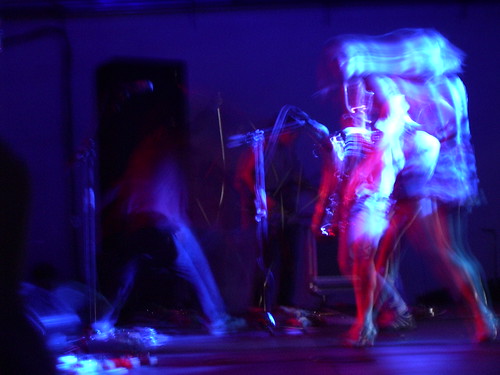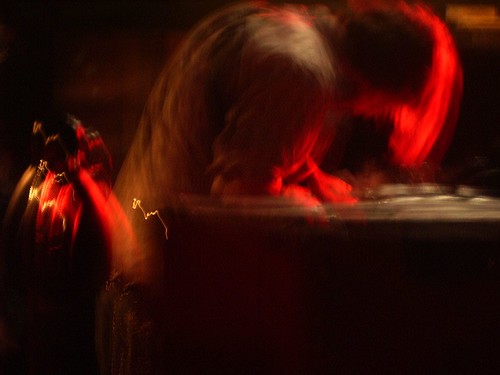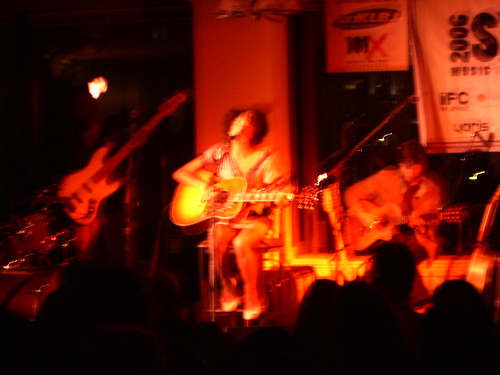The ribald rock’n’roll spirit of Guns’n’Roses and their ilk has long since evaporated into the smog. Once they owned Sunset, roaring up the strip in outlandish automobiles, yelling and brawling and fucking on these very streets. The vogue was always for excess, in all manners and guises. But no more.
Its
Drive for about an hour across the wrong side of the tracks, to a deserted business park in
Sweeping away early accusations of grunge-bandwagoneering and developing his Stone Temple Pilots into one of the most fascinating and flamboyant rock bands of the era, tussling with personal problems in a very public arena, even hooking up with a motley crew of ex-Guns for Velvet Revolver, none of this could’ve prepared us for the sight Weiland greeted audiences with at the first Revolver shows. Described within these pages as resembling a “Nazi rent-boy” and a “gay fashion designer”, Weiland fronted this band chock-full-of-frontmen, cladding his bone-brutal body in slutty skintight rock gear, topped off with a Fuhrer’s cap for more evil, authoritarian cool, commandeering the audience, toppling teasingly into them, dancing a chainsaw stadium-ballet that no-one who ever saw it would ever forget.
Here is a rock’n’roll frontman, he seemed to be baying, a man to follow the footsteps of Ozzy, of Iggy, of
And yet here, ultimately, is a man, all his mortal frailties on display. Peer through the fogged window he spray-painted ‘Fucking Fuck!!!!!!’ upon in spray-paints one wild night, into the control room, and you’ll find Weiland, rail-thin and sporting a skintight maroon Velvet Revolver tee and corduroy hipsters that hang around razor-sharp bones. He got here a little late but all is forgiven, the delay being not a fix or some trouble with the police, as it might once have been, but a late-running birthday party in the park for one of his son Noah’s friends. You can tell, given the choice, Weiland would still be at the party, spending time with his family; he’s only just won them back, after his problems with chemicals and the law, and still keenly remembers how their loss felt.
Its one of the most charming things about Scott Weiland, this sense of gratitude for the second chance he’s been given and embraced, a tale he tells with the sincere fervour of a Born-Again. The passion with which he declares his love for his wife and children is positively molten. Funnily enough, Kerrang! undertook this interview on the understanding Weiland’s private life would be off-limits for discussion, but Scott offers these tales of heartache and redemption himself, seemingly gaining an empowerment from the retelling. Certainly, it would seem there’s a grand distance between Weiland the man, and Weiland the Rock God, the Imp Perverse prowling the stage.
“I always looked at myself as an artist in the studio, and a performer onstage, the dark clown playing out dark theatre,” he explains, launching into the first of a sequence of extensive responses, many of which answer the bulk of my questions before they’re asked. “It’s performance art. If I can’t be taken over by that character, then there’s no use in doing it at all. I’m not myself onstage, it’s another person who I allow to take over the person you’re speaking to
“That guy up onstage is the person I used to be… I used to get confused, though, and that’s why I used to have so many problems getting loaded all the time. I used to get confused about who I really was. I’ve been diagnosed with Bi-Polar disorder for years, and if I was perfectly medicated, I would be the most boring songwriter ever. My wife says, ‘Thank God our relationship isn’t perfect because otherwise you wouldn’t have any songs anymore.’”
He grins, but you can sense the tension, the pain, underneath his words. None of this, you guess, is easy.
“When I’m writing songs for a record, I start tearing apart my soul, digging up journals, napkins, dredging up a year’s worth of therapy, locked up with a needle in my arm… When I started writing the record, I had to make sure I was tightening my shit up and getting my family back together. So I had to leave that person behind, the person who was the inspiration for this record, and prepare myself to go on the road and be strong enough to handle this whole media thing that’s happened.
“Where I’m at, my whole thing was, was I ever really a man? No, I don’t think I ever really was. I think every musician gets to the point where you realise being Peter Pan for your entire life only works for a little while. My chief goal was to achieve a rapid emotional puberty, or I wouldn’t have been able to get my family back.”
Is it frightening to reconnect with this Mr Hyde-type alter-ego up onstage?
“No, the music takes over. When I’m actually recording the song, that’s when I’m close to the emotional content. Live, it’s a primordial thing, a sensual thing. It’s about the beat, it’s sexual and violent. That’s what I’m attracted to, at that moment, onstage.”
How conscious are you of what’s going when you’re out onstage?
“It depends upon what mood I’m in before I hit the stage. The best gigs are the ones where there’s something that absolutely infuriates me before I go onstage, something that causes me to have a psychiatric meltdown up there. I’ll throw a full-metal wobbler. But that will inspire the most majestic performance. I think what really gives Velvet Revolver their impact is this sense that anything could happen. It’s that Evel Kenievel element, there could be a trainwreck at any moment.
“There are some big egos in this band, there’s some tension. But it’s that tension which creates absolute brilliance: it’s the tension that means everybody’s feeling it, everyone’s testosterone is at boiling point, and everyone’s hair’s standing up on the back of their neck, playing with complete intensity and complete passion. Nobody’s falling asleep onstage.”
Weiland’s not in the mood for holding anything back. Certainly, this is a man rudely acquainted with how live performances, and life itself, can collapse into the ugliest, most exhilarating trainwrecks when you’re least expecting. But he’s right; Velvet Revolver teeter every night between majesty and misery, chasing a mercurial promise of rock’n’roll nirvana, but hasn’t this High-Wire act always been the stuff of great rock’n’roll?
“There’s two sides to me as a performer; there’s the theatrical side, and then there’s the side of me that is willing to be torn apart and leave the stage bloodied, beaten and gorged. True and real rock’n’roll is a perfect marriage of sex and violence. And that’s where the energy has always been created, it’s been that way since the ‘50s. Rock’n’roll inspires you to do one of two things, and that’s to fight or fuck. Or both.”
Oddly enough, this confirmed Arena Rocker says he “sorta missed out on Arena Rock, cuz I never had an older brother to take me to the shows. The first show I ever played was at a club called
Young Weiland must’ve been quite a sight. Though he grew up singing in the choir in church – “They always made me sing the solos, and I remember it being horrifying because, when you’re little, all the other little kids out there would snicker and laugh at you, but music was everything I ever wanted to do.” – by the time he hit 8th Grade, his heroes were David Bowie, The Sweet, and Johnny Rotten.
“When I was a kid, I spent a lot of time dressing up in costumes. I always used to spend a lot of time pretending I’m somebody else. My mother and father thought I’d become an actor, and in a sense that’s what I do when I’m on stage. I would make costumes out of anything really. In fourth grade, when the whole Glam thing was going on, I came back from staying with my Dad in
“I had a friend in seventh grade, John Wild, who came back from Summer vacation in
Ironically, the night before we meet up with Weiland, he’s been out rocking the LA nightlife at a
“
As he’s explained, in the past Weiland has struggled with the contradictions inherent in being a Globally Recognised Rock’n’Roll Star and “A father of two beautiful children, a husband who takes care of his wife, who provides for his wife, who fucks his wife whenever she’s willing to ‘put out’.” Are there similar contradictions inherent in playing such a grand, theatrical ‘character’ onstage with Velvet Revolver when the lyric sheet – new single ‘Falling To Pieces’ in particular – is so rooted in his own, real-life and down-to-earth confllicts?
“I kinda struggle with that myself, to tell the truth,” he answers. “I cannot make a record with just one flavour, I’m not just feeling one way all the time. There are so many different emotions on this record. I went through the worst, most depressing period of my life. I didn’t think I was gonna get my family back but, at the same time, I was filled with so much venom towards her because, in my mind, I thought she was fucking someone else. She wasn’t, but in my mind I thought she was. I wanted to fuckin’ have her killed, that’s how I felt sometimes. But other times, I would remember everything we’d done together, and experiences that we’d had, look at our wedding video. I would just break down.
“There’s so many different emotions, running the gamut from A to Z. It’s not a black album, it’s not a white album; it’s everything. It’s not a completely depressing, poor-me fuckin’ album, like some of the earlier STP records were. You wanna know why? Because I won’t sit there and say ‘Pardon me’ anymore, I’m a fuckin’ man and I’ll own up to what I’ve done now. I’ve made my mistakes and I’ll fuckin’ own up to them, if you fuck me then I’ll fuck you. That’s the way it is. If I’m hurt, then I will say, yeah, I’m hurt. I’ll admit that too. All those emotions are on that record.
“A lot of times, on certain songs, the riff and the beat inspired me to write music that’s pretty fucken sleazy and dirty and, for lack of a better term, music that girls and guys should fuck to. It’s good stripper-fuckin’ music, and there’s nothing wrong with that. You know why? People should spend more time fuckin’, and a lot less time… worrying about…”
He’s struggling to finish his sentence, so he cuts to the chase.
“You know what? Everybody should just spend more time fuckin’. I’ll tell you why, when my wife and I are having a lot of sex, the relationship’s healthier, happier. When we’re having less sex, we don’t get along as well. It’s the fuckin’ truth. If you’re having more sex, aren’t you getting along better with your chick? Sexual energy, between two people – not just a guy and a girl, whatever – it’s so fuckin’ important.”
Of course, alongside the stripper-fuckin’ music, Velvet Revolver’s debut album harbours a potent power-ballad, the epic and dark ‘Falling To Pieces’. Telling Weiland’s recent history in the plainest, most poetic language, it’s the subject of one of the more chilling, poignant, powerful music videos on television now, dramatising the recent flashpoints in Weiland’s turbulent marriage, and his relationship with illicit and dangerous chemicals. Weiland and his wife, Mary, play out a number of these scenes, against a backdrop of seedy backstage areas, overdose-cramped emergency rooms, their own rapidly-crumbling dream-home. It could have been mawkish trash. In practice, it’s a three-minute rollercoaster that’ll leave you chilled, disturbed, but mostly moved.
“I’ll tell ya, for me, it was pretty heavy,” remembers Weiland. “But it was the only way to go about doing it. I was pretty scared when I made the decision to actually tell the real story. Because it could’ve gone either way – either it’d turn out amazing, and would have a huge impact, on a real emotional level, or it could’ve ended up really cheesy. I’ve really never done any real acting like that before. There weren’t any actual lines to say, it was more intense than that: I couldn’t hide behind any dialogue. I had to get everything across, all the emotion was non-verbal. Everyone had to dig deep inside of themselves, if it wasn’t going to be convincing it would be a complete pile of fucking bullshit.
“I didn’t even watch MTV or VH1 for the first couple of weeks, I didn’t want to hear any feedback on it at all. But I’m happy about it, the feedback has been great. That song is the pivotal point on the album, that was where it all started changing, for me and for the band. That song was written the day after I was arrested, and if things hadn’t changed there, then the band couldn’t have worked. I don’t even know if I’d be talking to you now. That song really tells the story of what happened over the year leading up to that event, and really, in a sense, tells the story of what’s happening now, by telling the story of what happened leading up to that day.
“If it hadn’t have been such a powerful song, on a musical level, I wouldn’t have been moved to write those lyrics, that melody. That song was the exact moment where I realised that Slash and I could really be one of those classic songwriting teams.”
It’s been an hour, and its time for Weiland to return home. He offers, kindly, to answer more questions on the phone later, but – understandably, even commendably – nothing’s going to interrupt this next appointment, a quiet evening in with Mary and the kids.
One last quick question, Scott. What does Noah think, when he sees Velvet Revolver up there onstage? Does he see Scott Weiland, Nazi Rentboy frontman, or does he just see Daddy?
“My son thinks he’s in the band,” he laughs. “He is completely intrigued by what I do for a living. We’re very similar. When he comes to the shows, we have to put a little mic-stand right on the side of the stage, by the monitor boards, so he can sing and dance along. If it’s not set up, he throws a bit of a fit.”
That sounds like great rock-star training…
“Exactly,” he laughs. “Throwing a fit is definitely great rock-star training.”
(c) 2004 Stevie Chick




No comments:
Post a Comment